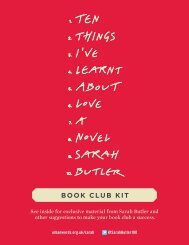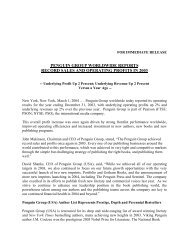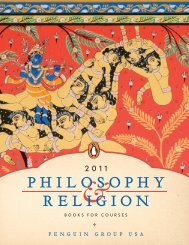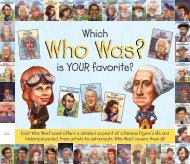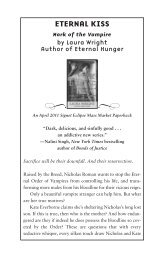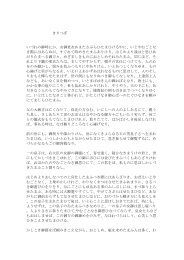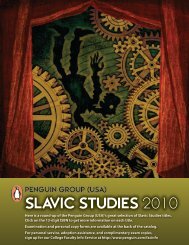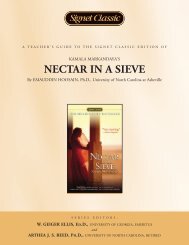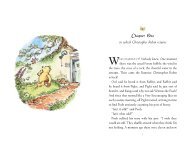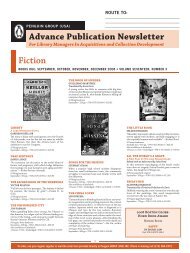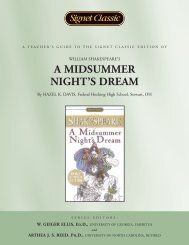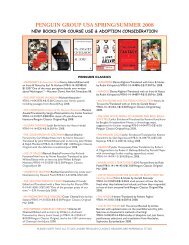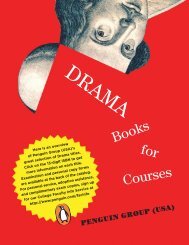Christopher Marlowe's Doctor Faustus - Penguin Group
Christopher Marlowe's Doctor Faustus - Penguin Group
Christopher Marlowe's Doctor Faustus - Penguin Group
Create successful ePaper yourself
Turn your PDF publications into a flip-book with our unique Google optimized e-Paper software.
12<br />
ARCHETYPE<br />
A Teacher’s Guide to the Signet Classics Edition of <strong>Christopher</strong> Marlowe’s <strong>Doctor</strong> <strong>Faustus</strong><br />
Introduce or review with students the different types of literary archetypes with emphasis on<br />
the magician. Other types might include the wanderer, the orphan, the warrior, and the martyr.<br />
Descriptions and even personality tests to identify students’ own archetypes can be found online<br />
and in personality handbooks. Helpful sites include:<br />
http://en.wikipedia.org/wiki/Archetype<br />
http://ericdigests.org/1996-4/mythic.htm<br />
http://www.niedfeldt.com/heroeswithin/journey.html<br />
Discuss with students:<br />
1. What characteristics define the Magician archetype?<br />
2. What are his goals?<br />
3. What are his fears?<br />
4. What are his nemeses?<br />
5. Name some magician archetypes in literature, film, and society. (Consider Harry Potter,<br />
Narnia’s White Witch, Frodo Baggins, Merlin).<br />
6. Has society’s attitude towards magicians changed over time? If so, how and why?<br />
III. BUILDING BACKGROUND KNOWLEDGE IN LANGUAGE<br />
Reading their first (or even second or third) Renaissance play poses a challenge to many students<br />
due to the complex diction, syntax, and dialect of the time. Students are often surprised to hear<br />
that the language of Marlowe and Shakespeare is not, in fact, “Old English.”<br />
TRADING INSULTS<br />
Make the language of Dr. <strong>Faustus</strong> appealing through Elizabethan insults. Ask students to choose<br />
two adjectives and one noun from lists of Elizabethan words and hurl them at each other loudly,<br />
trying to keep a straight face (which is almost as challenging as the pronunciations). Such lists can<br />
be found in books on teaching Elizabethan theater, or on websites such as: http://www.renfaire.<br />
com/Language/insults.html<br />
PARODY<br />
Challenge students to prove their understanding of Elizabethan language despite their complaints.<br />
Invite them to “rewrite <strong>Christopher</strong> Marlowe.” In this creative writing assignment, ask students<br />
to take a short excerpt from the play, such as the Prologue on page one, and “translate” it for<br />
an audience of 21 st century young adults by altering diction, syntax, and style, but maintaining<br />
Marlowe’s plot and meaning. To extend the assignment, students can take an excerpt from a modern<br />
text, or even their own personal writing, and “translate” it into the Renaissance style of Marlowe.<br />
This activity strengthens skill in audience, purpose, and comprehension, and can also be used as a<br />
directed reading or post-reading assessment.<br />
ONLINE TEXTUAL COMPARISON<br />
Students can take an online look at the different translations of Dr. <strong>Faustus</strong> from the original to<br />
the present, and compare how the language has changed while the meaning remains the same. One<br />
online source is:<br />
http://www.perseus.tufts.edu/Texts/faustus.html#table<br />
Ask students to review one scene or section of a scene and a make a list showing the different<br />
renderings of a key speech. When they share their charts, ask students to discuss how the different<br />
wording affects their reaction to the play.



